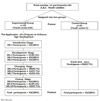Abstract
Purpose
The purpose of this study was to investigate the effects of a program to enhance ego-development for elementary and middle school students from low income families.
Methods
The study was a pretest-posttest design with a nonequivalent control group. The participants were 84 students who were admitted to after-school programs in three youth centers. Data were collected using questionnaires and analyzed using descriptive statistics, χ2-test, and t-test.
Figures and Tables
Table 1
The Contents of a Program to Enhance Ego-development for Elementary and Middle School Students from Low Income Families

References
1. Sung KM, Hyun M, Gu JA, Shin HS, Hwang WJ, Jin JH, et al. Human growth and development: Theory & Practice. Seoul: Komoonsa;2014.
2. van Gent T, Goedhart AW, Knoors HET, Westenberg PM, Treffers PDA. Self-concept and ego development in deaf adolescents: a comparative study. J Deaf Stud Deaf Educ. 2012; 17(3):333–351.

3. Lindfors K, Elovainio M, Wickman S, Vuorinen R, Sinkkonen J, Dunkel L, et al. Brief report: the role of ego development in psychosocial adjustment among boys with delayed puberty. J Res Adolesc. 2007; 17(4):601–612.

4. Gfellner BM, Armstrong HD. Ego development, ego strengths, and ethnic identity among first nation adolescents. J Res Adolesc. 2012; 22(2):225–234. DOI: 10.1111/j.1532-7795.2011.00769.x.

5. Allen JP, Hauser ST, Bell KL, O'Connor TG. Longitudinal assessment of autonomy and relatedness in adolescent-family interactions as predictors of adolescent ego development and self-esteem. Child Dev. 1994; 65(1):179–194. DOI: 10.1111/j.1467-8624.1994.tb00743.x.

6. Bursik K, Martin TA. Ego development and adolescent academic achievement. J Res Adolesc. 2006; 16(1):1–18.

7. Song IS. The developmental and differentiated changes in dimensionality self-concept across ages. Korean J Educ Res. 1989; 27(1):85–103.
8. Choi JW, Kim HJ. Domestic violence affects the mental health of adolescents: mediating effects of self-concept. Korean J Youth Stud. 2011; 18(1):73–103.
9. Sung KM, Lee HJ. Effects of violence victimization on mental health of children and adolescents: analysis of mediating effects of self-concept. J Korean Acad Community Health Nurs. 2012; 24(4):407–418. DOI: 10.12799/jkachn.2013.24.4.407.

10. Cho ES, Seo JM. Factors influencing children's mental health state. J Korean Acad Psychiatr Ment Health Nurs. 2010; 19(1):57–66.

11. Yoo IY. Parenting stress of adolescent children. Korean Parent Child Health J. 2005; 8(1):17–22.
12. Abubakar A, Van de Vijver FJR, Suryani AO, Handayani P, Pandia WS. Perceptions of parenting styles and their associations with mental health and life satisfaction among urban Indonesian adolescents. J Child Fam Stud. 2014; Forthcoming. DOI: 10.1007/s10826-014-0070-x.

13. Lee HJ. A longitudinal changes on maternal parenting stress in low-income families. J Korean Soc Child Welf. 2014; 46:115–141.
14. Yune HS, Oh KJ. The effect of social support on parenting stress among families in poverty: focused on children's age and environmental risk factors. Korean J Woman Psychol. 2010; 15(4):673–689.

15. Taylor RD, Budescu M, Gebre A, Hodzic I. Family financial pressure and maternal and adolescent socioemotional adjustment: moderating effects of kin social support in low income African American families. J Child Fam Stud. 2014; 23(2):242–254. DOI: 10.1007/s10826-012-9688-8.

16. Naver Magaginecast [Internet]. Wealth Management;2015. cited 2014 Dec 08. Available from: http://navercast.naver.com/magazine_contents.nhn?rid=2717&contents_id=71271.
17. Chung YJ. Effects of group art therapy on depression and self-esteem of children from low-income families. Korean J Child Stud. 2007; 28(4):97–111.
18. Lee EA, Lee SY. The effects of group art therapy on emotion regulation ability for adolescents in low-income family: based on person-centered art therapy. J Adolesc Welf. 2012; 14(2):25–49.
19. Kim JH, Chung DW. Effects of after-school self-esteem program on the self-esteem and peer relationship of children from low-income families. J Ecol Early Child Educ. 2011; 10(4):71–90.
20. Shin SI. The validity and reliability of the Korean version of the general health questionnaire. Korean J Soc Welf. 2001; 46:210–235.
21. Sung KM. Development of a self-evaluation scale to measure self-concept for children and adolescents. J Korean Acad Psychiatr Ment Health Nurs. 2012; 21(4):292–302.

22. Kovacs M. Rating scale to assess depression in school-aged children. Acta Paedopsychiatr. 1981; 46:305–315.
23. Cho SC, Lee YS. A development of Korean children depression scale. J Korean Neuropsychiatr Assoc. 1990; 29(4):943–956.
24. Waltz CF, Bausell BR. Nursing research: design statistics and computer analysis. Philadelphia, PA: FA Davis Company;1981.
25. Kuzucu Y, Bontempo DE, Hofer SM, Stallings MC, Piccinin AM. Developmental change and time-specific variation in global and specific aspects of self-concept in adolescence and association with depressive symptoms. J Early Adolesc. 2014; 34(5):638–666. DOI: 10.1177/0272431613507498.

26. Park JM. The effects of children's stress-coping behaviors on the relationships between children's perfectionism and depression [master's thesis]. Seoul: Sookmyung Women's University;2006.
27. Robles-Piña RA, Defrance E, Cox DL. Self-concept, early childhood depression and school retention as predictors of adolescent depression in urban hispanic adolescents. Sch Psychol Int. 2008; 29(4):426–441.

28. Kim JS, Kim SC, Yoo SK, Shin AW. Factors influencing stress levels of adolescents: with a focus on the impact of positive self-concept and self-confidence. Korean J Youth Stud. 2011; 18(3):103–126.
29. McCullough G, Huebner ES, Laughlin JE. Life events, self-concept, and adolescents' positive subjective well-being. Psychol Sch. 2000; 37(3):281–290.

30. Lee DW. Juvenile delinquency and multifactorial self concept. Korean Assoc Public Saf Crim Justice Rev. 2005; 19:357–383.




 PDF
PDF ePub
ePub Citation
Citation Print
Print






 XML Download
XML Download